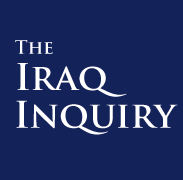The Iraq Inquiry
 |
|
| Date |
Hearings: 24 November 2009 – 2 February 2011 Report: 6 July 2016 |
|---|---|
| Location | London, United Kingdom |
| Also known as | Chilcot Inquiry (or Report) |
| Participants | |
| Website | www |
The Iraq Inquiry (also referred to as the Chilcot Inquiry after its chairman, Sir John Chilcot) is a British public inquiry into the nation's role in the Iraq War. The inquiry was announced in 2009 by Prime Minister Gordon Brown and published in 2016 with a public statement by Chilcot.
On 6 July 2016, Sir John Chilcot announced the report's publication, more than seven years after the inquiry was announced. Usually referred to as the Chilcot report by the news media, the document stated that Saddam Hussein did not pose an urgent threat to British interests, that intelligence regarding weapons of mass destruction was presented with unwarranted certainty, that peaceful alternatives to war had not been exhausted, that the United Kingdom and United States had undermined the authority of the United Nations Security Council, that the process of identifying the legal basis was "far from satisfactory", and that a war in 2003 was unnecessary. The report was made available under an Open Government Licence.
It was initially announced by Prime Minister Gordon Brown that the Iraq Inquiry would be held in camera, excluding the public and press. However, the decision was later deferred to Sir John Chilcot, the inquiry chairman, who said that it was "essential to hold as much of the proceedings of the inquiry as possible in public". In July 2009, when the inquiry commenced, it was announced that the committee would be able to request any British document and call any British citizen to give evidence. In the week before the inquiry began hearing witnesses, a series of documents including military reports were leaked to a newspaper which appeared to show poor post-war planning and lack of provisions.
The inquiry was pursued by a committee of Privy Counsellors with broad terms of reference to consider Britain's involvement in Iraq between 2001 and 2009. It covered the run-up to the conflict, the subsequent military action and its aftermath to establish how decisions were made, to determine what happened and to identify lessons to ensure that, in a similar situation in future, the British government is equipped to respond in the most effective manner in the best interests of the country. The open sessions of the inquiry commenced on 24 November 2009 and concluded on 2 February 2011.
...
Wikipedia
